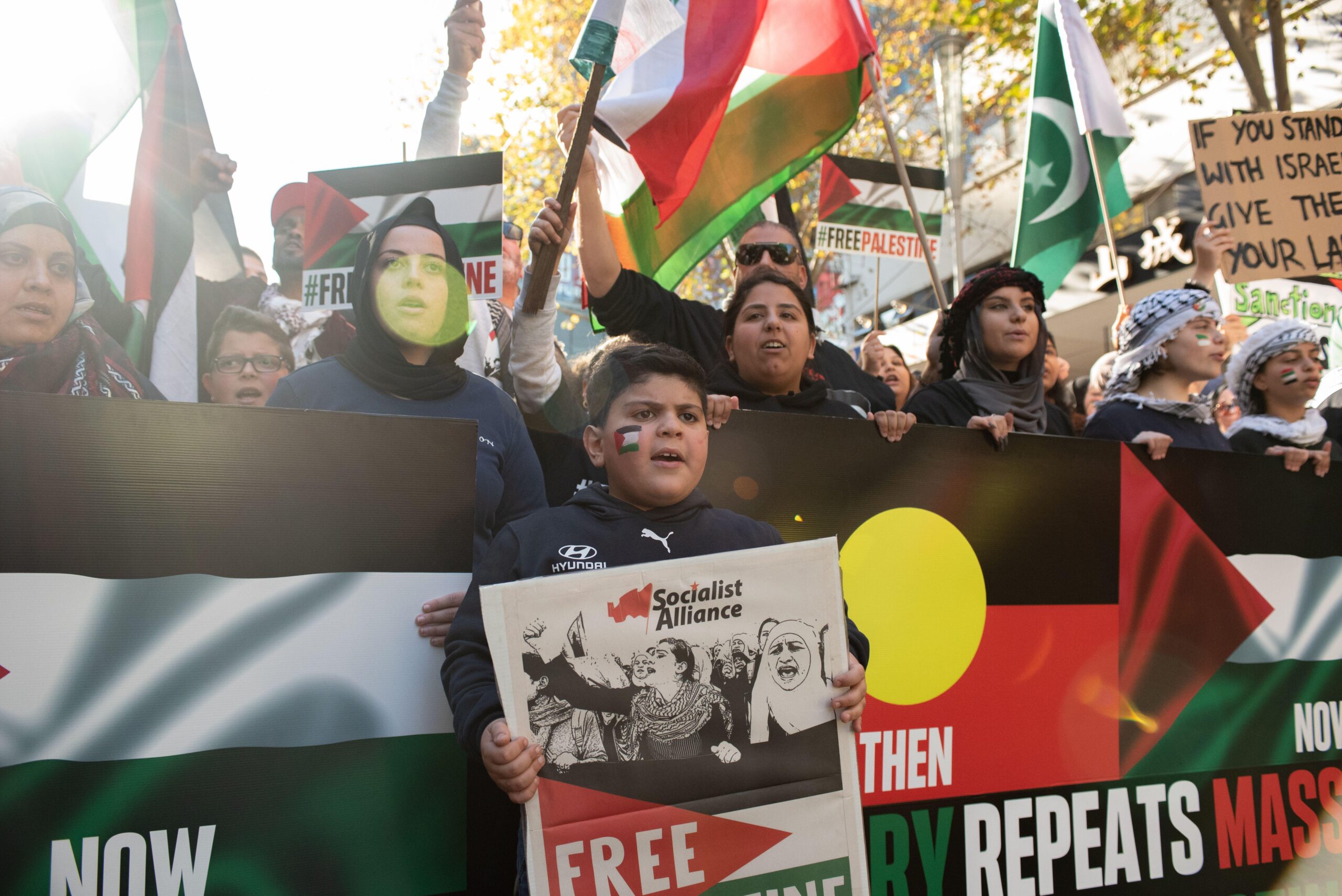Increasingly networks are forming between Indigenous and Palestinian groups through a shared experience of colonisation. In recent years, there has been a shift at the grassroots level in Australia in support of the Palestinian cause. Solidarity networks between the Palestinian diaspora and Indigenous communities are growing wider and deeper. This has charted a new course for Indigenous and Palestinian activists and advocates. It has also created a reality in which it is no longer possible to advocate for justice for one cause while ignoring the other.
In one of his last speeches in 2003, Edward Said, a Palestinian public intellectual, urged us to ‘remember the solidarity here and everywhere in Latin America, Africa, Europe, Asia, and Australia, and remember also that there is a cause to which many people have committed themselves, difficulties and terrible obstacles notwithstanding. Why? Because it is a just cause, a noble ideal, a moral quest for equality and human rights’, as he addressed the horrific murder of the American solidarity activist Rachel Corrie by Israel in 2003.
The struggle for justice, self-determination, decolonisation and demilitarisation against oppressive and colonial regimes have long underpinned the formation of transnational solidarity networks worldwide. The similarities in lived experience of Indigenous communities as well as the striking parallels through which settler colonial projects operate, binds colonised people together – including into extending support to each other as a strategy to counter the impact of colonial power structures.
In examining the Palestinian and Australian contexts, two textbook cases of settler colonial states, scholars have discerned that both Indigenous communities (Palestinians, and First Nations people) have been the target of systemic elimination and genocidal policies. These policies have sought to uproot and forcefully remove indigenous people from their lands and build structures that perpetuated and maintained the privilege of European settlers over the indigenous population. The ongoing eliminatory nature of settler colonialism continues to manifest today in various forms, be it through Israeli settlement expansionism, apartheid and military blockades in the Palestinian context, or disproportionate incarceration rates, deaths in custody and other forms of systemic violence faced by first nations people in Australia.
Former Israeli ambassador to Australia, Naftali Tamir, caused quite an embarrassment back in 2006 to both the Israeli and Australian governments, when he framed the relationship between the two countries as two white sisters in Asia without Asian characteristics, as they “are basically the white race.” In both contexts, the colonial narrative claimed that the lands were uninhabited; ‘terra nullius’ in Australia and ‘land without a people for a people without a land’ in Palestine. These declarations denied the presence of Palestinians in Palestine throughout history, and similarly, denied the presence of First Nations people on their ancestral lands for over 65,000 years. Similar strategies were applied, including genocide and ecocide, in the process of eliminating the Indigenous populations in both Palestine and Australia. After the establishment of both colonies, the European colonists set up structures and compartments in which they isolated, marginalised and controlled the Indigenous communities, one of which is now known as apartheid.
Given these similarities, it is logical for colonised people to rally in support of each other. In Australia, Indigenous solidarity with the Palestinian cause can be traced back to the Black Power movement in the 1970s. However, in more recent years, solidarity networks between the Palestinian diaspora and Indigenous communities have strengthened. Support for First Nations’ justice and self-determination has become an integral part of the movement for Palestine in Australia, and forms of solidarity by First Nations’ people with Palestinians now range from protests and conferences to responding to Palestinian civil society and grassroots call to BDS (Boycott, Divestment and Sanction campaign), as in the case of the 2021 Sydney Festival boycott campaign.
This has charted a new road map for Indigenous and Palestinian activists and advocates in which the intersections between both causes are made clear. There is a common understanding that the success of one anti-colonial movement hinges upon the success of the other, and that cooperation and solidarity in the form of amplifying demands, initiatives and campaigns while strengthening existing links, continuing to build new ones, and expanding these networks is the best strategy to de-marginalise, connect and empower both communities, locally and internationally.
The struggle for self-determination and justice in both contexts has a long and rich history and is likely to continue for generations. Since settler colonialism is deeply entrenched, an effective decolonial process necessitates various modes of resistance. One such mode is the establishment of solidarity communities for mutual learning and support. As we approach the Voice to Parliament referendum, the Australian Palestinian community has the opportunity to practice genuine solidarity with First Nations people. This can be done by learning more about indigenous issues, helping to create space for all Indigenous perspectives on the Voice to be heard and engaged with respectfully, and continuing to amplify First Nations’ campaigns and demands long after the referendum is over.
Editor’s note – this article was sourced and written before the events of the 7th of October 2023. The peer-review process also commenced prior to this date.
The views expressed in the Near East Policy Forum are those of the authors and do not represent the views of the Near East Policy Forum or any of its partner organisations.





Leave a Reply